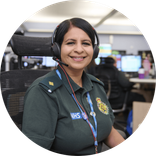Rita's Journey - ECAT Team Leader

Rita Bains is a team leader within our emergency clinical advice and triage (ECAT) team who has been with the Trust for 20 years.
I qualified as a nurse back in 1998 and then started my foundation degree in Paramedic Science in 2002 with EEAST, before becoming a paramedic in 2005. When I was a nurse in A&E, I understood what paramedics did, so when the opportunity arose I decided to take it and train to become a paramedic.
I briefly left the Trust in 2010 and went back to nursing, but soon realised I wanted to stay in pre-hospital care, so when the clinical support desk clinician role came up within the emergency clinical advice and triage (ECAT) team, I jumped at the opportunity.
The emergency clinical advice and triage team triages and intercepts the lower acuity and clinically appropriate 999 calls. We provide clinical advice to frontline crews and patients enabling us to signpost patients to appropriate care pathways.
I had been a clinical support desk clinician for several years before taking up the role as ECAT team leader, a natural progression to the next stage of my career. As a clinician I completed the audit course and was mentoring new starters and answering queries from new staff and non-clinician staff. The team and department were expanding, and I was one of the most experienced clinicians in ECAT. I wanted to challenge myself, so I applied for the ECAT team leader role.
There have been challenges along the way in my journey at EEAST. Whilst working for the Trust I have gone through a lot personally, as well as experiencing a period of illness, which resulted in me loosing 20% of my hearing. The team have supported my needs greatly and enabled me to work from home.
What I love about my role is that similarly to nursing, I am helping people, Im giving the right care to the patient, despite not seeing them face to face. Im able to signpost them to the correct services, whilst working with a variety of clinicians; from mental health nurses, paramedics and emergency care practitioner who are paramedics with more advance assessment skills. It is through this communication that we are able to share knowledge with each other, meaning we are always learning.
EEAST is both a friendly and professional environment to work in with supportive and approachable management. Within ECAT, we work well as a team which makes the department run successfully and we are always encouraged to share our ideas.
